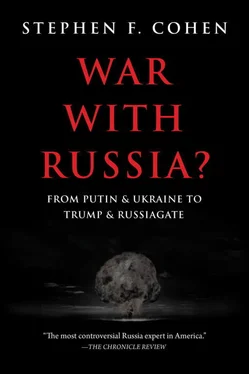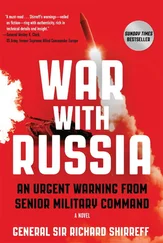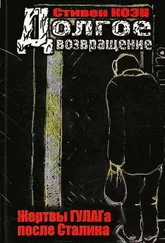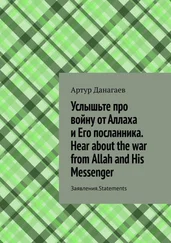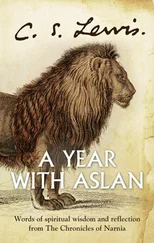* * *
We are in a new Cold War with Russia today, and specifically over the Ukrainian confrontation, largely because Washington nullified the parity principle. Indeed, we know when, why, and how this happened.
The three leaders who negotiated an end to the US-Soviet Cold War said repeatedly at the time, in 1988-90, that they did so “without any losers.” Both sides, they assured each other, were “winners.” But when the Soviet Union itself ended nearly two years later, in December 1991, Washington conflated the two historic events, leading the first President Bush to change his mind and declare, in his 1992 State of the Union address, “By the grace of God, America won the Cold War.”
Bush added that there was now “one sole and pre-eminent power, the United States of America.” This dual rejection of parity and assertion of America’s pre-eminence in international relations became, and remains, a virtually sacred US policy-making axiom, one embodied in the formulation by President Bill Clinton’s secretary of state, Madeleine Albright, that “America is the world’s indispensable nation.” It was echoed in President Obama’s 2014 address to West Point cadets: “The United States is and remains the one indispensable nation.”
This official American triumphalist narrative is what we have told ourselves and taught our children for nearly twenty-five years. Rarely is it challenged by leading American politicians or commentators. It is a bipartisan orthodoxy that has led to many US foreign policy disasters, not least in regard to Russia.
For more than two decades, Washington has perceived post-Soviet Russia as a defeated and thus lesser nation, presumably analogous to Germany and Japan after World War II, and therefore as a state without legitimate rights and interests comparable to America’s, either abroad or at home, even in its own region. Anti-parity thinking has shaped every major Washington policy toward Moscow, from the disastrous crusade to remake Russia in America’s image in the 1990s, ongoing expansion of NATO to Russia’s borders, non-reciprocal negotiations known as “selective cooperation,” double-standard conduct abroad, and broken promises to persistent “democracy-promotion” intrusions into Russia’s domestic politics.
Two exceedingly dangerous examples are directly related to the Ukrainian crisis. For years, US leaders have repeatedly asserted that Russia is not entitled to any “sphere of influence,” even on its own borders, while at the same time enlarging the US sphere of influence, spearheaded by NATO, to those borders—by an estimated 400,000 square miles, probably the largest such “sphere” inflation ever in peacetime. Along the way, the US political-media establishment has vilified Putin personally in ways it never demonized Soviet Communist leaders, at least after Stalin, creating the impression of another orientation antithetical to parity—the delegitimization of Russia’s government.
Moscow has repeatedly protested this US sphere creep, loudly after it resulted in a previous proxy war in another former Soviet republic, Georgia, in 2008, but to deaf or defiant ears in Washington. Inexorably, it seems, Washington’s anti-parity principle led to today’s Ukrainian crisis. Moscow reacted as it would have under any established national leader, and as any well-informed observer knew it would.
Unless the idea of détente is fully rehabilitated, and with it the essential parity principle, the new Cold War will include a growing risk of actual war with nuclear Russia. Time may not be on our side, but reason is.
Part II
US FOLLIES AND MEDIA MALPRACTICES 2016
Secret Diplomacy On Ukraine
January 20
DIPLOMATIC ACTIVITY BY WASHINGTON, PARIS, GERMANY, Moscow, and Kiev since early January, largely unreported in the American media, may be the last, best chance to end the Ukrainian crisis. Russian President Vladimir Putin appointed two trusted and experienced associates as his personal representatives to Kiev and to the anti-Kiev rebels in Donbass. A few days later, on January 13, President Barack Obama placed a call to Putin, the man he had vowed to “isolate” in international affairs, with Ukraine a priority of their discussion. Two days later, a leading American and Russian opponent of negotiations, Victoria Nuland and Vyacheslav Surkov, met privately in a remote Russian enclave. On January 18–19, representatives of German Chancellor Angela Merkel and French President Francois Hollande met with Ukrainian President Petro Poroshenko in Kiev.
At issue were two essential elements of the Minsk Accords, drafted by Merkel and Hollande and ratified by Putin and Poroshenko but resisted for many months by Poroshenko: constitutional legislation in Kiev granting the rebel regions a significant degree of home rule; and the legitimacy of forthcoming elections in those regions. All sides reported significant progress, though Poroshenko said he lacked sufficient votes in the Ukrainian Parliament, a tacit admission he fears the possibility of a violent backlash by armed ultranationalist forces.
Dire problems at home have compelled all of these leaders to undertake the intense negotiations, problems ranging from Europe and Syria to Russia’s economic woes, as well as their own political standing at home. In this context, the US media-political narrative is wrong about what Putin wants in Ukraine: not a permanently destabilized country, as is incessantly reported, but a peaceful neighbor that does not threaten Russia’s vital economic or security interests—or permanently divide millions of inter-married Russian-Ukrainian families.
These negotiations face many obstacles—in particular, powerful opposition in Washington and NATO. But the secret diplomacy represents a possible turning point, a fork in the road, one that will test the qualities of the leaders involved and could shape their historical reputations, first and foremost those of Presidents Obama and Putin.
The Obama Administration Escalates Military Confrontation With Russia
February 3
THE PENTAGON HAS ANNOUNCED IT WILL quickly quadruple the positioning of US-NATO heavy weapons and troops near Russia’s western borders. The result will be to further militarize the new Cold War, making it more confrontational and more likely to lead to actual war.
The move is unprecedented in modern times. Except for Nazi Germany’s invasion of the Soviet Union during World War II, Western military power has never been positioned so close to Russia, thereby making the new Cold War even more dangerous than was the preceding one.
Russia will certainly react, probably by moving more of its own heavy weapons, including new missiles, to its Western borders, possibly along with tactical nuclear weapons. This should remind us that a new and more dangerous US-Russian nuclear arms race has also been under way for several years. The Obama administration’s decision can only intensify it. The decision will have other woeful consequences, undermining ongoing negotiations by Secretary of State John Kerry and Russian Foreign Minister Sergei Lavrov for cooperation on the Ukrainian and Syrian crises and further dividing Europe, which is far from united on Washington’s increasingly hawkish approach to Moscow.
We can only despair that these ongoing developments have barely been reported in the US media and publicly debated not at all, not even by current American presidential candidates or raised by moderators of their “debates.” Never before has such a dire international situation been so ignored in a US presidential campaign. The reason may be that everything which has happened since the Ukrainian crisis erupted in 2014 has been blamed solely on the “aggression” of Russian President Putin—a highly questionable assertion but an orthodox media narrative.
Читать дальше
